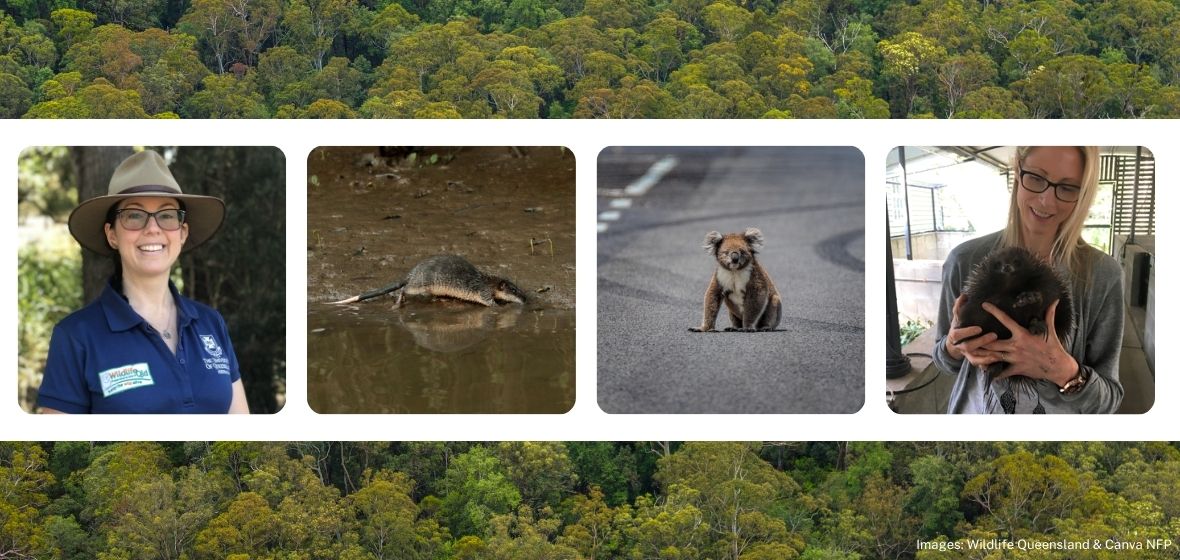
2 May 2024
Wildlife Queensland’s project officers have had a busy month, not only participating in field-based wildlife conservation efforts but also finding time to secure funding for future initiatives and contributing to wildlife conservation publications. Wildlife Queensland is proud to acknowledge their achievements.
Raising awareness of rakali
Last month, Ecologist and Wildlife Queensland PlatypusWatch Project Officer Dr Tamielle Brunt was awarded a grant from the Brisbane Airport Community Giving Fund to support her project aiming to raise awareness of the rakali (Hydromys chrysogaster).
The rakali is a native Australian water rat that is often misunderstood and overlooked due to its resemblance to common rodents. With its distinctive golden underbelly, white-tipped tail and secretive nature, this native mammal remains an underappreciated gem in Brisbane’s local waterways.
Educating the community
Dr Brunt’s project aims to change the misconception by developing and delivering an engaging and visually appealing presentation to reshape public perceptions of this species. The presentation will highlight the rakali’s unique features and crucial role in the ecosystem using high-quality photographs from local wildlife conservationists.
“I look forward to sharing my knowledge about rakali with the community so they can connect and appreciate a species that most likely lives close by in their neighbourhood waterways,” said Dr Brunt.
The project will deliver these presentations across the greater Brisbane area, targeting community members to foster a deeper connection and appreciation for their local wildlife. The Brisbane Airport Community Giving Fund will assist in financing the preparation and running the various workshops.
Community benefits of healthy waterways
Through education, Dr Brunt hopes to inspire community stewardship to actively participate in local conservation activities, such as joining Wildlife Queensland (WPSQ), bushcare or catchment groups. She believes that engaging with local nature not only aids in protecting waterway species like the rakali but also enhances the mental health and well-being of the community members involved.
Factors influencing koala hospital admissions
In April, Dr Kate Dutton-Regester, Ecologist and Wildlife Queensland’s EchidnaWatch Project Officer, published a research paper in the Australian Journal of Zoology entitled “Koala admissions to a wildlife hospital in coastal New South Wales, Australia, over a nine-year period, 2014-2022”.
The koala (Phascolarctos cinereus) population in Australia, particularly in the Port Macquarie region, has been facing severe threats that have drastically reduced their numbers. The region serves as a vital habitat for these iconic marsupials.
Human activities the main reason for admissions
Dr Dutton-Regester reviewed the records of 1,227 koalas admitted to the Port Macquarie Koala Hospital between 2014 and 2022 to analyse the main reasons for their admissions and to assess the trends and risk factors over time.
The findings reveal that human-related activities are a major cause, accounting for nearly half of the admissions. Common reasons include ‘dangerous area’ and ‘motor vehicle accidents’.
Young vs older koala admissions
The study also noted that young koalas are particularly vulnerable to such dangers, as well as to dog attacks and diseases like chlamydia, which is a significant health issue among this group.
Although over half of the koalas could potentially be rehabilitated and released back into the wild, older koalas faced higher mortality rates.
Public education needed for koala well-being
The research highlights both the critical need for public education and intervention to reduce these risks and the importance of ongoing efforts to manage and conserve this beloved Australian species.
Dr Dutton-Regester hopes the findings will stimulate further research, foster collaborative efforts, and contribute to the long-term survival and well-being of koala populations in the Port Macquarie region and beyond.
Read Dr Dutton-Regester’s publication here.
What you can do:
- Become a member of Wildlife Queensland (WPSQ) and discover how you can participate in local conservation activities.
- Learn to spot the difference between swimming rakali and platypus.
- Report koala sightings in Queensland.
- Subscribe to our eBulletin Talking Wildlife to learn more about your local wildlife, plus Wildlife Queensland’s latest news and offers.
Breaking news!
On 28 April 2024, Wildlife Queensland’s consultant ecologist, Jessica Lovegrove-Walsh, and project officer, Paul Revie, recorded the first confirmed sighting of an endangered greater glider in Deongwar State Forest, South East Queensland, not seen in the area since the late 1990s. Read more …
